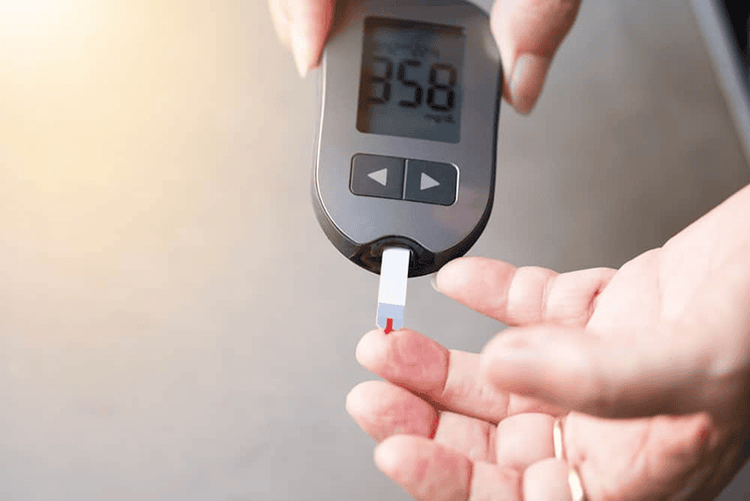This is an automatically translated article.
Polycystic ovary syndrome is one of the leading causes of infertility in women, and besides, it is closely related to another metabolic disorder, that is diabetes.
1. What is polycystic ovary syndrome?
Polycystic ovary syndrome (PCOS) is a common hormonal disorder in women of childbearing age and is one of the leading causes of female infertility. In the United States, polycystic ovary syndrome affects 6 to 12% of women of reproductive age, which is about 5 million.
Buồng trứng đa nang là một trong những nguyên nhân gây vô sinh hàng đầu
2. The relationship between polycystic ovary syndrome and diabetes
Women with polycystic ovary syndrome have higher male hormone levels, and are also less sensitive to insulin (insulin resistance). It is such insulin resistance that increases the risk of developing type 2 diabetes, and in fact more than half of women with polycystic ovary syndrome have type 2 diabetes by age 40. High levels of androgens (male hormones) lead to a host of other health problems, such as irregular periods, no ovulation, acne, hair loss but increased facial hair growth. and human body.
Women with polycystic ovary syndrome are more likely to be overweight, obese, and have difficulty losing weight, which means that diabetes is more likely to occur and the ability to control blood sugar is more limited.
Researchers in Australia collected data from more than 8,000 women and discovered that those with polycystic ovary syndrome face a four to eightfold increased risk of developing type 2 diabetes. times compared with those without polycystic ovary syndrome.
In this study, obesity was an important risk factor. In another previously performed study, almost 27% of premenopausal women with type 2 diabetes also had polycystic ovary syndrome. And in a 2017 Danish study, it was found that women with polycystic ovary syndrome had a fourfold increased risk of developing type 2 diabetes, and they also tended to find their diabetes earlier. 4 years compared with those without polycystic ovary syndrome.

Buồng trứng đa nang làm tăng nguy cơ mắc đái tháo đường tuýp 2 lên tới 4 lần
Not only with type 2 diabetes, but polycystic ovary syndrome is also linked with gestational diabetes and type 1 diabetes. According to another Australian study, pregnant women with polycystic ovary syndrome are nearly three times more likely to develop gestational diabetes than pregnant women without polycystic ovary syndrome. Various studies have shown that polycystic ovary syndrome and its symptoms are also common in women with type 1 diabetes.
From the above study results, experts recommend that women with polycystic ovary syndrome should have periodic screening for diabetes earlier and more often than those without polycystic ovary syndrome.
3. How does treating one problem affect the other?
Because polycystic ovary syndrome and diabetes are linked, treating one problem is bound to have an impact on the other.
Maintaining exercise is an extremely important factor to keep the body healthy during the treatment of type 2 diabetes and to improve overweight and obesity. The process of exercise burns energy, reduces excess weight, makes the body more sensitive to insulin, improves the effect of insulin, resulting in better blood sugar control. Exercise has also been shown to help alleviate symptoms associated with polycystic ovary syndrome.

Tập luyện thể dục giúp hỗ trợ giảm nhẹ triệu chứng liên quan tới buồng trứng đa nang
Besides exercise, diet also plays a key role, and the food composition should contain many beneficial foods, such as whole grains, fruits, vegetables, lean proteins, fats. useful,...
Treatment of polycystic ovary syndrome also has certain effects on diabetes. Some women with polycystic ovary syndrome are prescribed by their doctor to use birth control pills, to stabilize their menstrual cycle and treat acne, but some types of birth control pills have the risk of increasing blood sugar. blood pressure, affecting diabetes. However, if metformin is used to treat type 2 diabetes, it may be helpful in reducing the insulin resistance that is common in women with polycystic ovary syndrome.
Not only for people with polycystic ovary syndrome or diabetes, but in any case, it is necessary to visit and consult with a specialist, to determine the specific condition as well as are assigned the most appropriate treatment for each situation.
Customers can directly go to Vinmec Health system nationwide to visit or contact the hotline here for support.
Articles refer to the source: CDC













